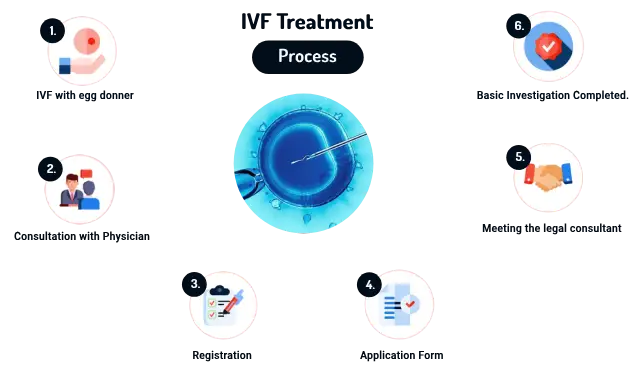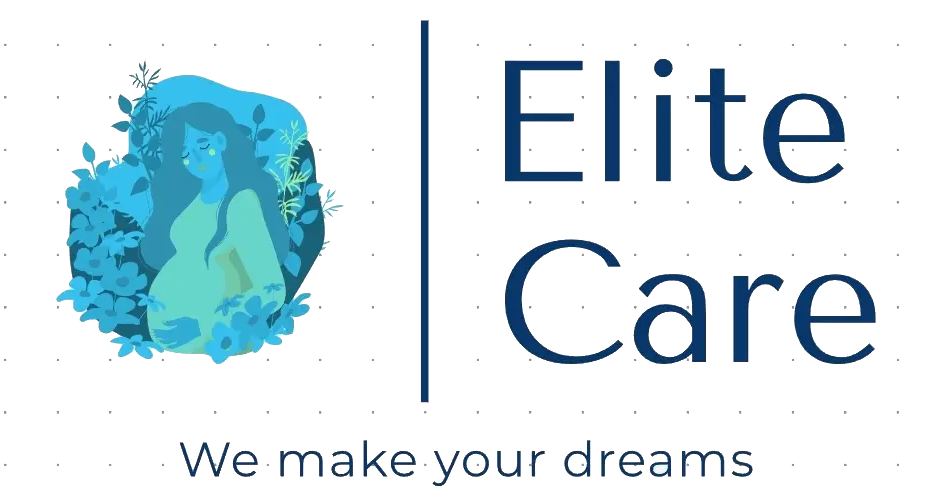Our Process
Home : : Our Process
Screening Donors and Recipients
The expert will examine the donor’s cervical conditions and sexually transmitted disorders.
Hormone analysis and ultrasound scan will perform on the 3rd day of the period.
Ovulation Initiation for Donor:
Cervical cultures assess for the attendance of any organism like Chlamydia or ureaplasma.
Cervical cultures assess for the attendance of any organism like Chlamydia or ureaplasma.
Serum prolactin & TSH level
Ultrasound examination of the uterus and hysteroscopy to search for the presence of lesions that might get in the way of implantation, such as fibroid tumors, polyps, or scarring.
Ultrasound examination of the uterus and hysteroscopy to search for the presence of lesions that might get in the way of implantation, such as fibroid tumors, polyps, or scarring.
-

Screening for partners to confirm their HIV & hepatitis.
-

The male partner’s semen will analyze through semen cultures and a direct anti-sperm antibody test.
-

The couple will meet with the counselor to converse about significant psychological and social issues.
-

The whole procedure is exactly the same as the patient undergoing IVF treatment.
-

Meeting the legal consultant for legal counselling
-

In one cycle, we bring the menstrual period as close to both donor and the female partner before the IVF procedure. Preferably, the female partner gets a period a couple of days before the donor.
-

The recipient is likely to require estradiol & progesterone to prepare her uterine lining for the implantation of the transferred embryos
The pregnancy and the take-home baby rates are higher corresponding to stimulated cycles, as less introduction to drugs and hormonal variation.
-

Egg donor criteria that the intended parents should check before selecting and starting:
-

You should select young and healthy women between the ages of 21 to 32 years.
-

You must check for her significant deformity or genetic disorders as in any disorder presence, cannot provide eggs.
-

The intended parents must select the donor after several medical screenings for any physical or mental ailments, physical examination, endocrine profile, ultrasound examination, or pelvis.
-

The screening test for HIV, HbsAg, VDRL & hepatitis is necessary.
-

She should be aware of the process and her contribution to rights.
Young and healthy women between the ages of 21-32 years are eligible for the egg donation program here at our center. So, we have a few selection methods which are as follows:
-

The potential donor should be in generally good health.
-

Should not have any major deformity or genetic disorders.
-

Medical screening for any physical or mental ailments.
-

A physical examination, endocrine profile, ultrasound examination, or pelvis.
-

Screening test for HIV, HbsAg, VDRL & hepatitis.
-

An on-paper approval form verifying the full understanding of the egg donation procedure.
Also, we recognize that donors may have several questions to be asked. We shall try to take in a few once we share our opinion about egg donation.
We reviewed a few women – out of that 91% were quite extremely content with the experience.
Our study reviewed the inspirations of oocyte donors and found that they were directed by an overall ethic of giving.
Oocyte donor has the contentment of providing wholeness to the couple by dealing with their proud parents.
-

As there are several questions behind the program egg donation, we would like to share an infertile couple’s note who had a healthy baby in the egg-sharing program at our centre:
-

Have you appeared to terms with the absence of a genetic relationship between the intended mother and the child? What, if any result, do you wait for this to have on the parental relationship and the family unit?
-

Are you prepared, sensitively and actually, to endure the rigors of an IVF cycle?
-

Are you set to deal with the disappointment of a failed process after such a significant emotional and financial investment?
-

Can you recognize outside stressors that might impact you and your treatment cycle?
IVF Egg Donation
Momsoon provides Egg Donation programs for women who are unable to conceive using their own eggs. This is more common in couples with increased maternal age seeking Assisted Reproductive Technology.
You might consider using donor eggs if:
-

You are above 40 because fertility reduces steeply after 40 with diminished ovarian reserve. This implies that the quality of the eggs is low.
-

You have Premature Ovarian Failure, a condition in which the ovaries stop producing eggs very early maybe before 40.
-

You are at a risk of passing on a genetic condition to your child
-

Your doctor suggests using donor eggs because of poor egg quality resulting in failed IVF Cycles earlier.
When it is difficult to establish pregnancy using the woman’s own eggs, treatment with donor egg –IVF is an option. Poor ovarian function is commonly due to natural reproductive aging or surgery affecting one or both ovaries. More rarely, women undergo cessation of their ovarian function before the age 40, a condition called premature ovarian failure.
In donor egg-IVF the eggs are from a young woman who will undergo ovarian stimulation and an egg retrieval procedure. Once the eggs are harvested and in the laboratory, they will be inseminated using semen from the recipient’s partner. The created embryos are then transferred to woman’s uterus. The recipient woman carries the pregnancy and delivers her child.
Who can be an egg donor?
Egg donors are young women who donate their eggs to recipients purposely to help women/couples with infertility and desire to have a child. Egg donors are anonymous and can be chosen from ART banks. Egg donors are thoroughly screened to ensure that they are healthy to donate their eggs.
IVF with Donor eggs process:
Stage 1: Preparation of Egg donor and Recipient mother
-

Plan the treatment cycle
-

Prepare you for the embryo transfer through medication
-

Identify a suitable egg donor
-

Synchronize yours and the egg donor’s treatment cycles
-

During the treatment cycle, blood tests and ultrasound examinations will be done to determine the uterine receptivity. It is important to ensure that your uterus is hormonally prepared to receive the embryos
Stage 2: Ovarian Stimulation and Egg Retrieval
-

The egg donor will undergo ovarian stimulation with fertility medications to stimulate the simultaneous growth of multiple egg-follicles in her ovaries
-

The eggs will be harvested through a minor surgical procedure called egg retrieval.
-

The donated eggs are inseminated with the sperm from the recipient’s partner in the IVF Lab.
Stage 3: Embryo Transfer
-

Transfer of the embryo(s) into your uterus that is synchronized with hormone treatment to receive the embryo(s).
-

Embryos that are not transferred can be frozen for future use
-

Following the embryo transfer, you will continue on hormonal treatment to support the uterus for implantation.
Donor eggs
In IVF with donor eggs, the eggs are retrieved from a young woman who will undergo ovarian stimulation and an egg retrieval procedure. Once the eggs are harvested in the laboratory, they will be inseminated using semen from the recipient’s partner. The created embryos are then transferred to the recipient’s uterus. The recipient woman carries the pregnancy and delivers her child
Who can be an egg donor?
Egg donors are young women who donate their eggs to help women/couples with infertility Egg donors are anonymous and can be chosen from ART banks. Egg donors are thoroughly screened to ensure that they are healthy to donate their eggs.
The Process
If decide to schedule a consultation, we can arrange for Client to meet and see all of
those that will be involved in your treatment (coordinator’s, physicians, embryologists,
attorney). For those that would also like to meet with potential surrogates at the same
time, a prior notice will be required in advance of your visit so that the surrogates may
be present.
We screen and select only those women are in excellent health, free of any sexually
transmitted disease and have had a healthy reproductive history. Each prospective
Surrogate must have had at least one child and be involved in a stable marriage or
partnership, with her partner being supportive of her decision. She must also be willing to
be committed to the intended parents and be willing to follow our stringent protocol of
screening and counselling. We only want to present Client with women who are
genuinely interested in helping others in their quest to have a child. Prior to any candidate
being represented to intended parents, she has to complete the following minimum
requirements

IVF treatment Process
-

Meeting the Co-Ordinator
-

Consultation with Physician – medical counselling.
-

Registration.
-

Filling in application by the doctor confirming that Client need surrogacy
-

Meeting the legal consultant for legal counselling
-

Back to Co-Ordinator to consolidate the process.
-

Basic Investigation Completed.
Medical testing of the surrogate.
-

General Health Screening
-

Infection screening, Hepatitis B and C, HIV, Syphilis
-

Blood sugars
-

Hormone Profile
-

X ray Chest, ECG
-

Ultrasound abdomen and Pelvis
-

Hysterosalpingogram to outline the cavity of the uterus and tubes.
-

ECHO cardiogram
-

Anesthetic fitness
Counselling
-

Detailed counselling for the surrogate and her husband / family
-

Checking on family support
-

Checking on accommodation
-

Diet counselling
